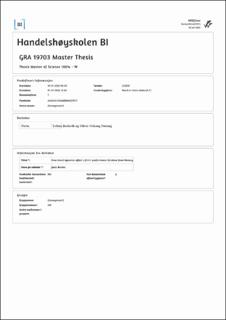| dc.description.abstract | This paper examines whether there is a connection between board dynamics, board characteristics and a firm’s performance. The sample is made up of companies with specific qualities. We have examined private companies in the Norwegian region between the period 2000-2020, where companies that have sold a minimum of 20% of their shares have been tracked. From this, using dummy variables, we assigned the company’s board-specific control variables based on if the company was controlled by insiders, outsiders or shared equally by both parties. Results from the panel regression suggest that the more the largest family owns there more like there is Inside Control, but we can conclude that there more likely are Shared Control and Investor Control that will be the setup in the years after the transfer event. Further, we discover that board composition does not have a significant effect on firm performance, nor does board size. Lastly, we have discovered that there are signs that firm-specific characteristics can have significant explanatory power on the firm's performance, of which firms with high leverage perform poorly. | en_US |
